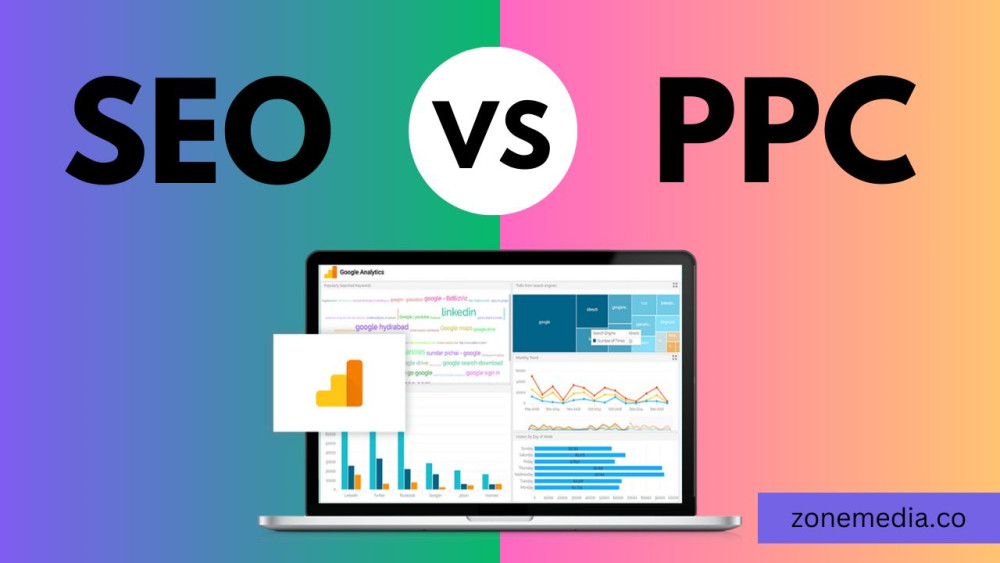What is Search Engine Optimization (SEO)?
Search Engine Optimization (SEO) is the process of optimizing your website to improve its visibility in organic search engine results. SEO involves various techniques and strategies aimed at enhancing a website’s relevance, authority, and user experience. This includes keyword research and on-page optimization (like meta tags and content improvements), off-page activities (such as building backlinks), and technical SEO (ensuring your site’s structure and speed are optimal).
The goal of SEO is to rank higher in search engine results pages (SERPs) for relevant keywords without paying for placements. SEO is a long-term strategy that focuses on driving organic traffic, improving user experience, and increasing credibility. Success in SEO often requires ongoing effort and adaptation to search engine algorithms, but it can lead to sustainable, cost-effective traffic growth over time.
What is PPC?
Pay-Per-Click (PPC) is an online advertising model where advertisers pay a fee each time their ad is clicked. Unlike SEO, which focuses on organic search results, PPC involves bidding on keywords to display ads at the top of search engine results pages or on other websites. Google Ads is the most popular PPC platform, but there are others like Bing Ads and social media ad networks.
PPC campaigns offer immediate visibility and traffic, as ads appear prominently on search results and other relevant sites. Advertisers set a budget, bid for keywords, and create targeted ads that are shown to users searching for specific terms or interests. The key advantage of PPC is the ability to quickly drive traffic and control the budget, but it requires ongoing investment to maintain visibility and achieve results.
What Are the Differences Between SEO and PPC?
SEO and PPC are distinct digital marketing strategies, each with its own strengths and functions:
Cost Structure: SEO focuses on organic search results and is generally cost-effective long-term, though it requires significant time and effort. PPC involves paying for each click, leading to a direct and immediate cost-per-click model.
Results Timeline: SEO typically yields results over a longer period as it takes time for search engines to index and rank your site. PPC provides immediate visibility and traffic, as ads start appearing as soon as campaigns are launched.
Sustainability: SEO aims for long-term sustainability with ongoing optimization, which can lead to sustained traffic without recurring costs. PPC offers short-term gains with visibility that disappears once the budget is exhausted.
Control and Flexibility: PPC allows for precise targeting and control over ad placements, budgets, and keywords. SEO offers less control over rankings but focuses on building organic authority and relevance.
Traffic Sources: SEO targets users who actively search for specific keywords organically, while PPC can target a broader audience through various ad placements and demographic targeting.
Understanding these differences helps businesses decide how to allocate resources and develop strategies that best meet their marketing goals.
Weighing Up the Pros and Cons
SEO Pros:
Cost-Effective Long-Term: Organic traffic is free once rankings are achieved.
Credibility and Trust: Users often trust organic results more than paid ads.
Sustainable Results: Proper SEO can yield long-term, sustainable traffic and rankings.
SEO Cons:
Time-Consuming: Achieving and maintaining high rankings can take time and continuous effort.
Complexity: Requires ongoing adaptation to search engine algorithms and best practices.
Delayed Results: It can take several months to see significant results from SEO efforts.
PPC Pros:
Immediate Visibility: Ads appear instantly and drive traffic right away.
Targeted Advertising: Precise control over ad targeting based on keywords, demographics, and interests.
Measurable Results: Detailed performance metrics and analytics for tracking ROI.
PPC Cons:
Ongoing Costs: Continuous investment is needed to maintain visibility and traffic.
Click Fraud: Risk of fraudulent clicks that can waste your budget.
Short-Term Impact: Visibility and traffic stop when the budget runs out.
Balancing the pros and cons helps determine the right mix of SEO and PPC for your business.
Should I Invest in SEO or PPC?
Deciding whether to invest in SEO or PPC depends on your business objectives, budget, and timeline.
Choose SEO If: You’re looking for long-term growth and sustainability, have a limited budget for paid ads, or want to build organic credibility and trust. SEO is ideal for businesses aiming for ongoing visibility and lower cost-per-acquisition over time.
Choose PPC If: You need immediate traffic, have a specific short-term goal, or want to test keywords and audience segments quickly. PPC is suitable for generating instant visibility, driving targeted traffic, and achieving measurable results with precise control.
In many cases, a combined approach leveraging both SEO and PPC can be the most effective strategy. SEO and PPC can complement each other by providing comprehensive coverage across search results and optimizing traffic potential.
SEO and PPC Integration Strategies
Integrating SEO and PPC strategies can maximize your online presence and overall performance. Here’s how to effectively combine both:
Keyword Research: Use insights from PPC campaigns to inform your SEO keyword strategy. Analyze high-performing PPC keywords and incorporate them into your SEO efforts for more targeted organic traffic.
Landing Page Optimization: Ensure that landing pages used in PPC campaigns are optimized for SEO as well. This creates a seamless user experience and improves both organic and paid traffic performance.
Data Sharing: Leverage PPC data to identify trends and opportunities for SEO. Conversely, use SEO insights to enhance PPC targeting and bid strategies, ensuring both channels are aligned.
Cross-Channel Retargeting: Implement retargeting strategies to reach users who interacted with your PPC ads but did not convert. Use SEO to capture these users through organic search, increasing the chances of conversion.
Performance Monitoring: Continuously track and analyze performance metrics from both SEO and PPC campaigns. Use this data to make informed decisions, optimize strategies, and achieve better overall results.
By integrating SEO and PPC, you can create a cohesive digital marketing strategy that leverages the strengths of both approaches, driving traffic, improving visibility, and achieving your business goals more effectively.


